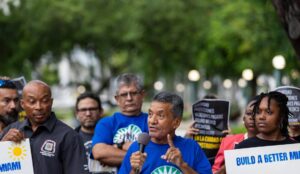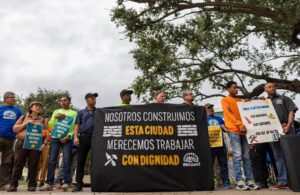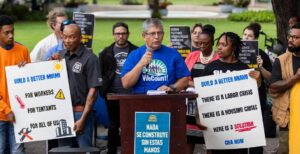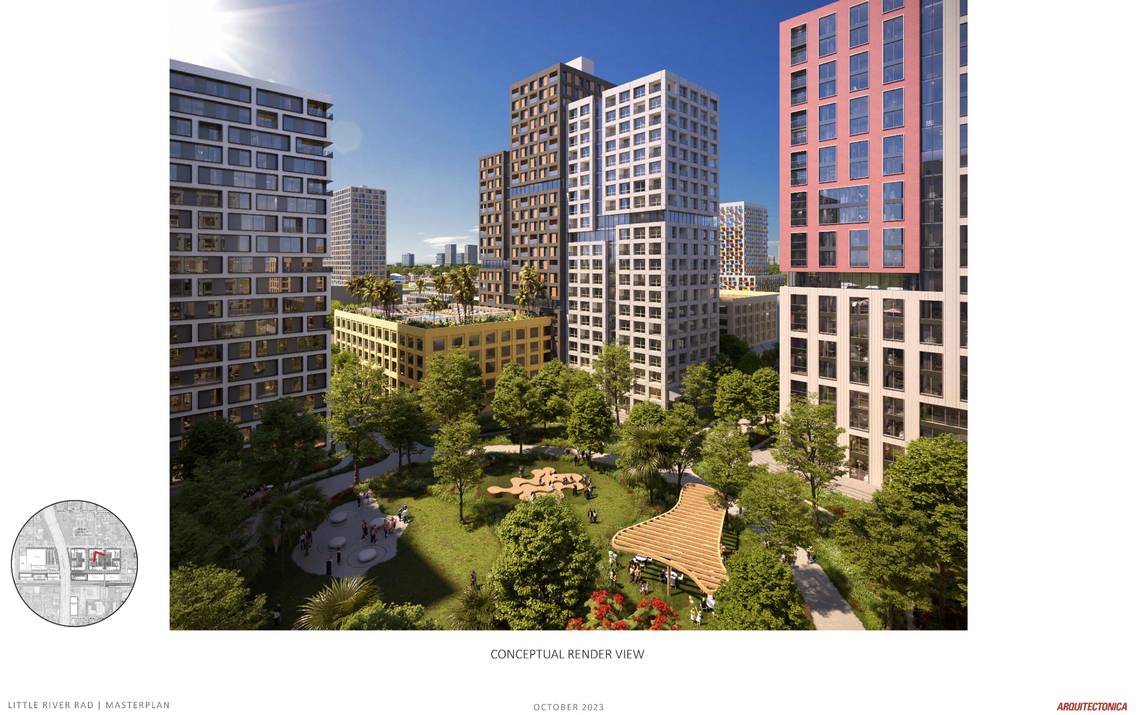CLIENT NEWS: Immigrant workers who are building South Florida fight for better pay, work conditions
November 7, 2024For the past two decades Javier Torres has steadied himself on the high scaffolding of countless buildings to apply the paint jobs that protect them from South Florida’s harsh sun and soaking rains.
The Colombian man, 64, is proud of his profession. It’s how he’s put his youngest son through college. But the work has also come at great cost.
Surrounded by colleagues wearing hard hats at a recent evening in front of Miami-Dade County Hall, Torres spoke of the bosses that had withheld wages, of the strong wind that nearly blew him off a scaffold at a job where he hadn’t been given a harness, of the heat illness that sent him tumbling from a ladder, of the electric wire that sent a shock through his body.
But Torres counts himself as lucky. Over the years, he said he has lost two colleagues to deadly falls.
“In this line of work, you do what you have to do,” he said.
Condo, apartment and office buildings are shooting up like weeds across the Miami skyline. But those who build them with their bare hands say wages are too low to cover housing, food and other basic needs. Over a half a dozen workers, all but one an immigrant, told the Miami Herald that wage theft is commonplace, that the arduous labor is done in unbearable heat and unsafe conditions, and that several of them had suffered injuries or lost colleagues in accidents.

A recently released report from the Miami-based worker-led organization WeCount! that surveyed over 300 construction workers across dozens of new South Florida developments valued at $10 million and over pointed to their accounts being representative of industry-wide issues.
That’s why the roofers, carpenters, plumbers, electricians, and laborers of Miami-Dade County are organizing to demand better job conditions in a state that has barred local governments from passing worker heat protections. Through the Build a Better Miami Coalition, they hope to negotiate a community-benefits agreement with the developers of a proposed public-private project in the Little River and Little Haiti neighborhoods that will need thousands of workers to build nearly 5,000 affordable apartment units, a new Tri-Rail station, green space and retail.
The ask: More contractor oversight, living wages, safety training for supervisors and workers, heat protections, and hiring local to the neighborhoods, among other priorities. The workers say that the large scale of the $2.6 billion, mostly privately financed project makes its developer a logical potential partner for their campaign. They hope to replicate this model across South Florida construction sites over time.
“We need to have that small seed of faith that we’ll be able to achieve these goals,” said Torres. The coalition includes WeCount!, a group that advocates for immigrant and low-income workers in South Florida, several labor unions and the Miami Workers Center, among others.
The Swerdlow Group, the developer spearheading the proposed project, hopes to make a dent in Miami’s housing affordability crisis while increasing public transportation and job opportunities in the area. Michael Swerdlow, a veteran developer and Swerdlow’s managing partner, said his company is committed to safe and good working conditions for construction workers, emphasizing that it had already made several significant commitments to the community in its project proposal. The company is set to meet with the Build a Better Miami coalition in early November.
“We will enter every agreement necessary to see to it that the workers are treated fairly and just the way they are supposed to be… We are very interested in the health and welfare of the workers. But we enter agreements with the appropriate parties,” he said, adding that he was available to speak with union labor leadership that reached out.
The redevelopment project, submitted in response to a request for proposals from Miami-Dade, requires county commission approval. The Office of Miami-Dade County Mayor Daniella Levine Cava said in a statement that the county itself would not be a signing partner in a potential agreement with the workers, but encouraged the possibility.
“We support developers working to include the voices of the community and build projects that benefit everyone in our community — to ensure that all can participate in our county’s economic growth, and create pathways for housing and opportunity,” said the statement from the county.
A BOOMING BUSINESS FOR SOUTH FLORIDA
It’s hard to drive down the streets of South Florida without hearing the drill of tools or the creak of a swinging crane in the wind. The construction industry’s health is critical to the region’s economy, said Ned Murray, the Associate Director of the Metropolitan Center at Florida International University, emphasizing that after the Great Recession in 2008, a slowdown in construction had a ripple effect throughout several industries, including the finance, insurance and real estate sectors.
“Our whole economy is really vulnerable if our construction industry does not remain strong,” Murray said.
Today, there are 272,300 construction and special trader workers in Miami-Dade, slightly more than 2007 levels. But increasingly, the industry has come to rely on immigrants to patch chronic labor shortages. Overall, Florida has a high rate of foreign-born construction workers compared to other states.
Miami-Dade’s Office of New Americans estimated in a June 2021 report that three-quarters of the county’s construction workforce had been born outside the United States. Murray noted that countless workers might not be reflected in official employment data because they have no legal status or are day laborers.
“You aren’t going to see an American citizen, a gringo up on a wall and covered in concrete and grease. We came to this country to move forward in life and support our families,” said Candido Solano, a 50-year-old worker from Nicaragua.
Several workers told the Herald that being undocumented, or simply immigrants, makes them more vulnerable to abuse and exploitation from unscrupulous patrons.
“If us immigrants didn’t exist, Florida wouldn’t exist. How many apartments, how many buildings, how many cities have we built?” said Luciano Pascual, a Mexican carpenter who came to Florida in 2007.
‘SO LITTLE FOR HOW MUCH WE DO’
Pascual, 40, has worked in construction for around a decade. But despite his years and expertise as a woodworker, the husband and father of two cannot afford a home.
“We receive so little for how much we do,” said Pascual. The WeCount! report found that the average hourly wage of construction workers is $19.14.
Meanwhile, 86% of South Florida construction workers do not make a living wage for a single adult with no dependents, according to the group’s findings, even though the workers are, on average, supporting two dependents besides themselves. More than half of the workers surveyed could not cover rent and mortgage or afford groceries, utilities and medical care for themselves and their families.
“The very workers we depend on to expand our housing supply, protect our buildings, make sure our community and city is prepared to be resilient in the face of climate disaster, are not making enough money to live, and they are also experiencing rampant violations of their rights and dangerous conditions,” said Zaina Alsous, WeCount!’s Miami director.
Researchers found that 12% of workers had experienced wage theft and that 31% of workers entitled to overtime had not been paid that extra time. Previous research suggests that Florida ranks among the top states for wage theft, which is when employers don’t pay money they legally owe workers. One worker told the Herald they had been waiting for a $2,000 check since 2018.
 Ramon Granera, the California-born child of Nicaraguan immigrants who has lived in Florida for four years, said he has been waiting for a contractor to pay him more than $3,000 since last winter for work done at a Pembroke Pines condominium complex.
Ramon Granera, the California-born child of Nicaraguan immigrants who has lived in Florida for four years, said he has been waiting for a contractor to pay him more than $3,000 since last winter for work done at a Pembroke Pines condominium complex.
The Herald reviewed correspondence that WeCount! sent the contractor, Cost Construction Group LLC, on behalf of Granera and another 17 workers earlier this year, requesting payment for over $35,000 in unpaid wages. The workers also reached out to the U.S Department of Labor and organized a press conference in Miami. Alex Rios, the registered agent for the company, declined to comment about the case when reached over the phone.
Granera, a father of two, said he had been late on rent and had his water shut off because he couldn’t afford to pay his bills after he failed to get the money he was owed. He sold personal belongings and used his savings to cover expenses, and wasn’t able to celebrate his Christmas, New Years, his anniversary or his son’s birthday.
“There wasn’t much I could do. He wouldn’t pick up the phone. The authorities investigate, but it takes time, and it’s already been a year and we haven’t gotten anything,” said Granera.
Seven workers were not paid two weeks of wages at Block 55, a massive affordable senior housing complex developed by the Swerdlow Group in Overtown, after a subcontractor asked them to be classified as independent workers and they refused, according to WeCount! and workers interviewed by the Herald. The Herald reviewed a sworn complaint made to Miami-Dade County’s wage theft program in March 2024, a year after the incident took place.
Joseph Shook, a lawyer for the subcontractor, denied the allegations and said that the workers had been required to get on the payroll for deduction purposes. He said all but three checks had been written and cashed, and that once the issue was discovered, it had been rectified. The lawyer said the checks for the other workers had been cashed in and that the contractor could not be accused of wage theft because they had not taken them wrongfully. WeCount! said that the workers had not cashed those checks themselves, that they had been signed with other people’s names and numbers, and that did not know what the company had done with them. The organization plans to continue its case against the subcontractor, arguing it’s their legal responsibility to pay the wages.
Generally the developer and owners of a project will hire a general contractor, who then hires subcontractors. WeCount! and workers say that while they acknowledge that wage theft and violations perpetrated by contractors or subcontractors is not directly the fault of owners and developers, there needs to be enough oversight to prevent these problems from happening in the first place. They argue that a community-benefits agreement would put these protections in place.
Michael Swerdlow, the veteran developer who leads the Swerdlow Group, said that at Block55 there had been four outside supervisors to ensure workers were being treated well and an independent firm was hired to ensure that contractors and subcontractors behaved in accordance with the law.
“When it comes to our attention, we fix it. This did not come to anybody’s attention,” said Swerdlow. “It’s the subcontractor’s duty to fix it. If he didn’ fix it, it’ll get reported to the contractor, who will attempt to fix it. We expect people to get paid, and until we hear differently, there’s nothing we can do about it.”
WORKPLACE INJURIES, DEATHS COMMON
The nature of construction work also makes it among the most dangerous industries in the country. There was one death every four days in Florida’s private construction industry in 2022, according to the U.S. Bureau of Labor Statistics, the highest fatality rate in any sector in the state.
In South Florida this year alone, Francisco Aparicio, 68, was fatally crushed between a forklift and a wall in Hialeah; John Robles, 49, fell from a balcony in Pompano Beach; Travis Jones, 29, drowned while cleaning a boat in Miami Beach, and Jose Antonio Rivera Perez, 63, died when he fell from a ladder on a scaffold in Fort Lauderdale.
The colleagues that the workers leave behind are often left with emotional scars. Erner Hernandez, a Honduran carpenter, told the Herald that he has witnessed three deaths while on the job. In 2017, a Metromover hit a crane and ejected his colleague from its basket while they were working in downtown Miami, killing him instantly.
 “After seeing accidents like that, you are always on edge at work. It leaves you psychologically a little damaged,” Hernandez said.
“After seeing accidents like that, you are always on edge at work. It leaves you psychologically a little damaged,” Hernandez said.
Non-fatal injuries are also commonplace, leaving workers vulnerable when an injury puts them out of work or burdens them with unexpected expenses. WeCount!’s report found that one-third of the workers interviewed did not receive safety equipment from employers, and that roughly three-quarters of them did not have employer-provided health insurance or receive paid sick days.
Edi Dominguez, a 32-year-old Mexican carpenter, said he nearly broke his ankle while carrying heavy metal panels while working at Block55 in July 2022. He took a month off to recover through worker’s compensation insurance, which Florida requires contractors to have. But he’s still battling medical bills from the injury that Dominguez and WeCount! say he should not have to shoulder.
And laboring under the hot Florida sun day in and day out also makes construction workers prone to heat stroke and heat-related illnesses. In recent years, the blazing temperatures have taken the lives of several outdoor workers in Florida. The report found that 86% of worksites had shade for rest, but that in a third of them the workers had to bring water themselves. Workers told the Herald that they sometimes don’t get the proper breaks or shade at their worksites despite the intolerable heat. Sometimes, the water available on site is contaminated or appears cloudy, and they have to bring their own supplies.
“I’ve been screamed at and told, why am I going to drink water every five minutes?” Dominguez said.
Labor and outdoor-worker advocates in Florida have for years pushed for heat protections in Florida, arguing that several deaths in the state could have been prevented with the right protections in place. This summer, the U.S. Department of Labor found that a contractor in Arcadia could have prevented the death of a worker who died while harvesting oranges in December 2023.
Months before the death, legislators in Tallahassee approved a law that bars local governments from passing local heat protections. Agricultural and construction companies were among those who opposed the measure. Peter Dyga, the president of the Associated Builders and Contractors chapter that represents commercial contractors in eastern Florida, said his organization opposed a lack of uniformity in standards across jurisdictions.
“We didn’t think it was practical or prudent to impose a local standard and are consistent on this,” said Dyga. “There’s a whole bureaucracy at the federal level that was designed to protect workers from these types of circumstances.”
The federal Department of Labor has proposed a new rule in July to create a federal heat standard, but it is not in effect. Some states have heat standards, but Florida is not among them.
NEW WAY FORWARD
Groups like the Build a Better Miami coalition argue that a community-benefits agreement is a way to get workers a seat at the table and strengthen existing commitments that developers and contractors make.
“We see the developer as a potential partner in this. This can inspire and show other developers across South Florida that it’s possible to move your development forward and protect workers and residents,” said Alsous, WeCount!’s Miami director.
In its county proposal for the proposed Little Haiti/Little River development, Swerdlow has made several community commitments, including ensuring that 20% of new hires were low income or public-housing residents; that 30% of all subcontracts are awarded to small businesses, as well as minority- and women-owned business; to prioritize local hiring and offer job fairs, and to fund tuition assistance and vocational training. They will also provide free internet in the building’s common areas and affordable housing units for two decades, and cover the expenses of building the Tri-Rail station.
Michael Swerdlow also said there will also be independent workplace watchdogs and protections from heat, such as access to plentiful drinking water. The veteran developer also emphasized that contractors pay no less than the federal government-set prevailing wages, which are higher than minimum wage.
 “I believe that anyone who puts a worker in danger is committing a mortal sin. The working conditions have to be as good as they can possibly be,” Swerdlow said.
“I believe that anyone who puts a worker in danger is committing a mortal sin. The working conditions have to be as good as they can possibly be,” Swerdlow said.
At a recent press conference announcing the launch of the campaign for the community benefits agreement, Arturo Rizo, an electrician from Nicaragua, pointed at the skyscrapers and office buildings that encapsulate downtown Miami like a tree canopy.
“Without construction workers, there are no buildings and apartments. And without buildings and apartments, there is no progress.”




















































